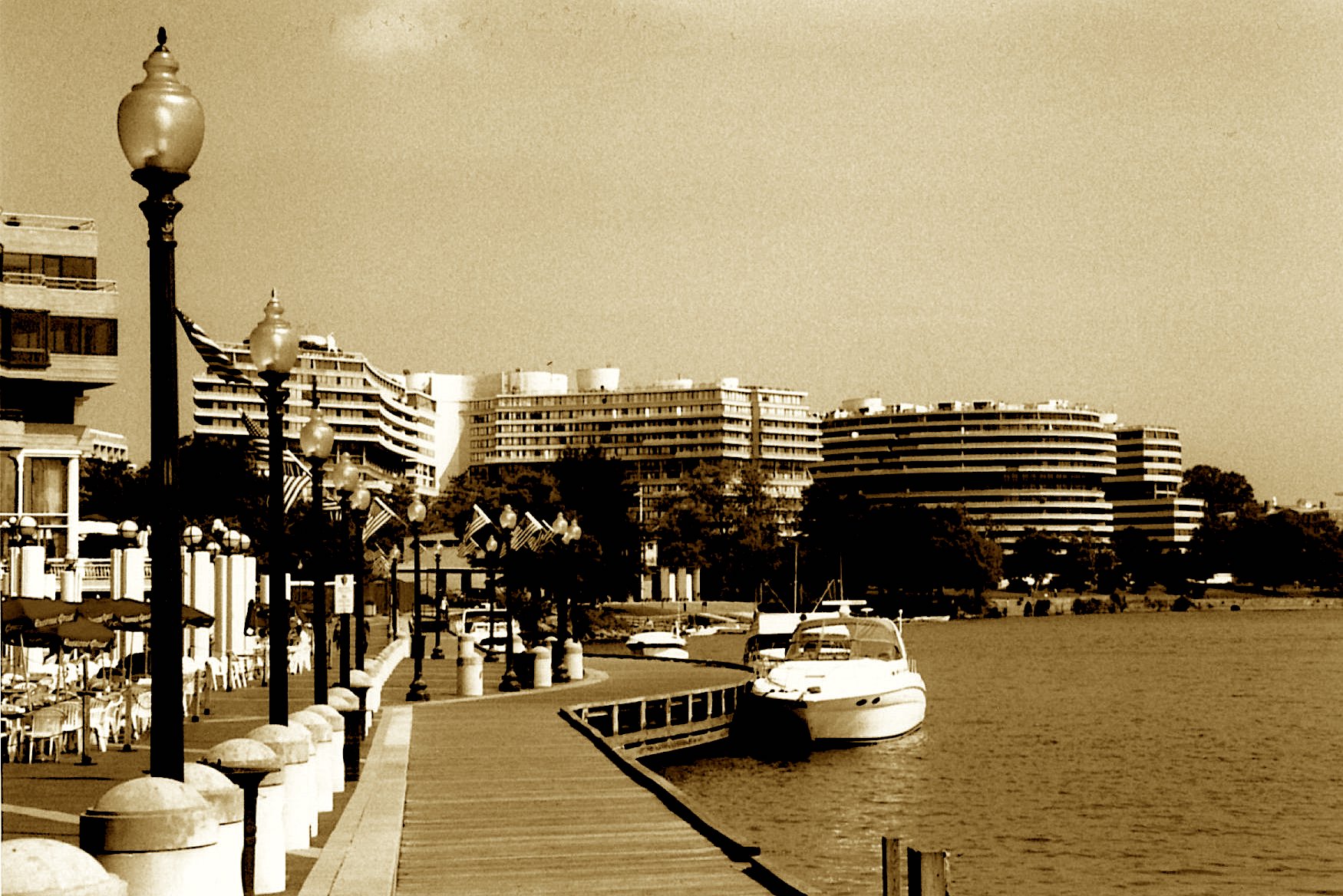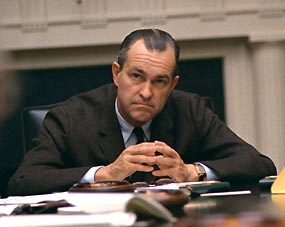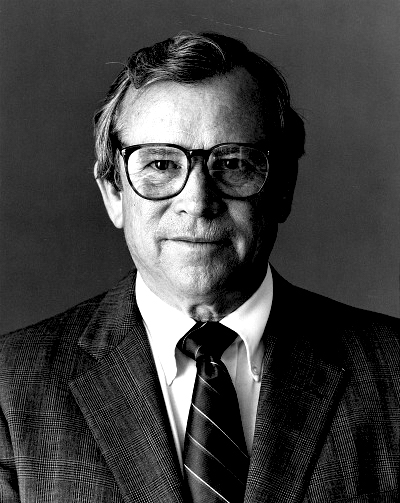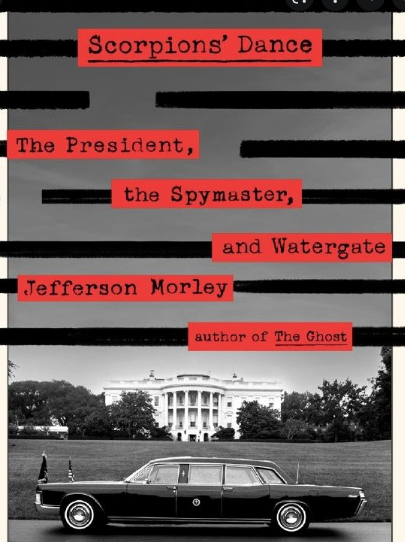James DiEugenio assembles evidence of an agency role in the scandal.

View of the Watergate complex from the Potomac river, 2001. (Wally Gobetz, Flickr, CC BY-NC-ND 2.0)
By James DiEugenio
Special to Consortium News
 Jefferson Morley begins his new book on Watergate, Scorpions’ Dance, in an adroit and forceful manner. Former C.I.A. Director Richard Helms has been called back to Washington from his new position, ambassador to Iran. He is beginning his testimony before the Senate Watergate Committee.
Jefferson Morley begins his new book on Watergate, Scorpions’ Dance, in an adroit and forceful manner. Former C.I.A. Director Richard Helms has been called back to Washington from his new position, ambassador to Iran. He is beginning his testimony before the Senate Watergate Committee.
Right at the start Helms makes categorical statements about the agency’s lack of involvement with just about every aspect of the unfolding Watergate scandal. Helms specifically denies any involvement at all with the break in, and adds that he was determined to make that point clear from when it happened to that moment.
The day was Aug. 2, 1973. Helms’ denials led both the CBS and ABC evening news programs. They were bannered by The New York Times and praised by Lou Cannon in The Washington Post. As Morley and others have revealed, the problem with Helms’ testimony is that it was, at best, deceptive, at worst, simply false. And, even worse, Helms likely knew this before he said it.

CIA Director Richard Helms in 1968. (White House, Wikimedia Commons)
For instance, one of the captured Watergate burglars, Eugenio Martinez, had an agency case officer before and after the break-in. Martinez was being paid a monthly stipend. Even before the Watergate break-in, the C.I.A. was extending aid to one of the band’s ringleaders, Howard Hunt. This involved a raid on Daniel Ellsberg’s psychiatrists’ office.
As Morley notes, although Helms tried to say he did not even know Dr. Louis Fielding, this was likely another dubious denial. Because the agency had extended support and aid to Hunt for that break-in. They even worked up a psychological profile on Ellsberg.
Helms said he did not even know Ellsberg had a psychiatrist. Yet he had seen the photos of the casing of the building before the break-in. And that was because the Agency was giving Hunt photographic help on the operation.
But in this first appearance, Helms tried to go even further. He tried to imply that he really did not know very much about Hunt at all. This is another point that Morley shows is false.
The author pegs the first meeting between the two most likely in 1957 in Havana.
But Helms knew of Hunt even earlier, due to Howard’s literary efforts; in this instance trying to get C.I.A. rights to Orwell’s Animal Farm.
Helms later encouraged and aided Hunt’s attempts to market a series of espionage novels to Paramount Pictures. But as Hunt notes toward the end of Scorpion’s Dance, once the Watergate hearings commenced, it was as if Helms never knew him.
Hunt & James McCord
There is a subsidiary question to this issue of Helms and Hunt. Namely, the relationship between Hunt and James McCord.
Hunt’s role in Watergate was to recruit the Cuban exiles out of Miami and guide them, as he spoke fluent Spanish. McCord was the technical expert on the surveillance elements of the operation at the Watergate Hotel. The reason being it was the home of the Democratic National Committee. Hunt and McCord maintained they did not know each other prior to their work for President Richard Nixon in April of 1972: Hunt at the White House and McCord at the Committee to Re-elect the President (CREEP).
But in his fascinating book on Watergate, Secret Agenda, author Jim Hougan made a strong case that this was also not accurate. There was evidence to show that the two already knew each other from working together while in the C.I.A. on anti-Castro projects and a Washington area surveillance operation.
At the time of the Helms appearance, his words echoed throughout the chamber. And like Colin Powell before the United Nations, there was really no one questioning him on that day.
Why? Because the entire media conglomerate had been immersed in the series put out by Bob Woodward, Carl Bernstein, Ben Bradlee and The Washington Post. It was those stories that set the template for almost every other newspaper and broadcast story about the phenomenon known as Watergate. This included the committee Helms was testifying before, Sen. Sam Ervin’s Senate Watergate Committee. That committee was controlled by a strong Democratic majority led by Ervin and Chief Counsel Sam Dash. They had little affection or sympathy for Richard Nixon. It would be more accurate to say that he was their target.
One Exception
There was one exception to this on that committee; one person who was not fully accepting the Woodward/Bernstein paradigm. This was Sen. Howard Baker of Tennessee.
Baker was the minority leader on that committee. Although he had a friendly relationship with Ervin in public, he was the first to diverge in private from where he felt that committee was headed. Which was towards the impeachment of Nixon.

U.S. Sen. Howard Baker in 1989. (U.S. Senate)
As Baker came into contact with these C.I.A. elements, he found them rather inexplicable.
If Hunt had retired from the C.I.A., why were they extending him technical help? And not just on Watergate, but on the ITT-Dita Beard matter. Who was the case officer for Martinez? And did Martinez inform him of the break-in before it happened? Why was Helms trying to separate himself from Hunt, and to a lesser degree, Jim McCord?
Baker decided that, for partisan reasons, Ervin and Dash were going to ignore these issues. Therefore, he decided to set up his own task force inside the committee. He and the minority counsel –and future senator– Fred Thompson — led it. Once they started their inquiry, the parameters did not decrease, they widened.
For instance, there was the issue of Robert Bennett. Bennett had purchased the Mullen Company. This was a PR operation which, as Morley writes, had employed Hunt on Helm’s recommendation after he retired from the agency. It turned out that the Mullen Company was a C.I.A. front. And it was from there that Bennett and Hunt badgered White House assistant Charles Colson to give Hunt a position in the White House.
Then there was Maxie Well’s desk. When Martinez was apprehended he had a key to her desk at the Watergate. That key opened all the drawers to that desk. She was the secretary to Spencer Oliver. Oliver was one of the targets of Jim McCord’s faulty bugging equipment, which the burglars were there to replace.
How did Martinez get this key? Wells said there were only two in existence and one was wrapped around her neck. Was there an inside man at the DNC? We will likely never know. Morley states Martinez refused to reply to these questions and part of his oral history has been classified.
CIA Memo
As is also revealed in Scorpion’s Dance, one of the documents under Howard Baker’s review was a C.I.A. memorandum of March 1, 1973. It stated Bennett had been feeding stories to Woodward “with the understanding that there be no attribution to Bennett. Woodward is suitably grateful for the fine stories and by-lines which he gets….”
Baker was naturally captivated by this memo. Bennett told Thompson that he knew nothing about the break-in before it occurred. But this collided with another fact Baker discovered.
 There was a sixth burglar on board the day before the last break-in. He was a young man named Tom Gregory. Gregory had second thoughts and backed out the day before. Interestingly, he went to Bennett to inform him of his decision. As Morley notes, The Washington Post did not disclose the Mullen Company was a C.I.A. front for two years.
There was a sixth burglar on board the day before the last break-in. He was a young man named Tom Gregory. Gregory had second thoughts and backed out the day before. Interestingly, he went to Bennett to inform him of his decision. As Morley notes, The Washington Post did not disclose the Mullen Company was a C.I.A. front for two years.
Helms also prevaricated about a C.I.A. operative named Lee Pennington. Pennington was a friend of McCord’s. Morley notes that Helms tried to disguise his knowledge of Pennington by giving out the name of another Pennington to confuse matters.
Lee Pennington was important to the whole affair. Just a few days after the break-in, contract agent Pennington went over to McCord’s home. He and his wife now began burning all kinds of materials. Although
Pennington said he only burned a few papers, the fire got so big that it blackened the walls of the residence, to the point it had to be repainted. As the C.I.A. later admitted, Pennington helped to destroy McCord’s files in order to eliminate any evidence of a connection between the C.I.A. and McCord. Since McCord’s past C.I.A. employment was common knowledge, one has to ask: was Pennington there to burn anything indicating a more current connection?
Let us close this discussion with two aspects which touch on the Washington Post, and Woodward and Bernstein.
When Thompson and Baker got hold of the C.I.A. memorandum about Bennett and Woodward the word got out about it at the Post. Bernstein called Baker for a meeting on the memo. Both men denied any such relationship with Bennett. Since Bernstein was not specifically mentioned by Bennett, his denial was at least mildly credible. But Woodward’s was less so. One has to wonder: was this discovery about his partner the impetus for Bernstein’s milestone Rolling Stone article in 1977 The CIA and the Media.
Related to this, as we all know, in 2005 Woodward and former F.B.I. officer Mark Felt decided to disclose that it was Felt who was Deep Throat. This was the nickname given to one of Woodward’s secret sources on Watergate. The character became quite central to the tale as a result of the Robert Redford-produced film of the Woodward/Bernstein book All the President’s Men. Who can forget the scenes of actor Hal Holbrook in those dark parking garages at night?
It turned out that Woodward made a mistake at this time. He and Bernstein allowed the University of Texas to purchase their Watergate papers. When Felt, who was suffering from early dementia at the time, decided to come out of the woodwork, Woodward donated his notes on Deep Throat to the Ransom Center as part of their agreement.
Ed Gray, the son of L. Patrick Gray, Nixon’s interim F.B.I. director, was completing a book that his father’s death had left undone. The resulting work, In Nixon’s Web, is a fine, overlooked contribution to the literature on the subject.
Nearing completion, Ed Gray visited the Ransom Center and looked over the new “Deep Throat” notes. After inspecting them all, and communicating with Woodward, he came to a startling conclusion. In these very notes, Woodward unconsciously revealed that Deep Throat was — as most people thought — a composite.
For instance, Woodward referred to two distinct sources in one set of notes. Also, there is information in those notes that Felt could not have known. Only someone close to CREEP could have. Could this have been Bennett? And if so, was this what Woodward did not wish to admit.
For reasons given above, we will never know what the real role of the C.I.A. was in Watergate. Because of the partisanship of the Ervin Committee — they resisted even printing Baker’s minority report — and the whirlpool created by The Washington Post, that role will remain clouded. But slowly but surely, that role is finally becoming, if not explained, as least delineated.
James DiEugenio is a researcher and writer on the assassination of President John F. Kennedy and other mysteries of that era. His most recent book is The JFK Assassination : The Evidence Today.
The views expressed are solely those of the author and may or may not reflect those of Consortium News.

I rather doubt that the author of this book will be invited onto CNN to promote it!
“…the entire media conglomerate had been immersed in the series put out by Bob Woodward, Carl Bernstein, Ben Bradlee and The Washington Post. It was those stories that set the template for almost every other newspaper and broadcast story about the phenomenon known as Watergate. . .”
The point to remember here is that The Washington Post had close links to the CIA and so did Ben Bradlee. I think Jim Hougan’s book claims that Bradlee was close friends with Helms.
Nixon repeatedly clashed with the CIA especially over his request to see the files on ‘the Bay of Pigs’ That Nixon should make such an extended effort to see the files on that subject does seem rather strange. However, Bob Haldeman later claimed that ‘Bay of Pigs’ was Nixon’s code for the JFK assassination. This makes a lot more sense.
The reason Nixon wanted to see those files was because he, like a number of other people, suspected that Vice President Johnson was behind the assassination. As far as I am concerned, the evidence clearly shows that he was.
In 1977 Frank Sturgis of the CIA, one of the Watergate burglars, told interviewer Bill O’Reilly the reason why Nixon wanted to see the CIA’s files on the JFK assassination:
“I believe that Nixon would have uncovered the true facts. . . He is lucky he didn’t get assassinated like President Kennedy got assassinated.”
Just think about that prospect: President Agnew!
Many thanks to whoever put that Bill O’Reilly interview, I nearly did not recognise him, onto YouTube. It is only an excerpt and lasts barely two minutes. But it is an absolute gem.
To be precise and fair to Morley, he says that Nixon wanted to see those files because he suspected he would be running against Ted Kennedy in 1972.
“I believe Nixon would have uncovered the true facts. . .He is lucky he didn’t get assassinated like President Kennedy got assassinated. ”
I have a thought on that. One I have expressed here in the past.
The CIA operates on the theory of taking few if any real chances. Examining the history forward from the murder of JFK is proof. No chance of being held accountable if the courts are on your side 100%.
JFK died in a hail of gun fire, MLK died of a sniper’s gun shot wounds and RFK died, again in a hail of gun fire.
It should be lost on no one that the vicious murder of Nixon in a similar manner would have gotten enormous amounts of scrutiny at a time when CIA was already being scrutinized.
The “Deep State” CIA had been “cornered” by a political evolution of sorts. Nixon knew damned well what CIA & company, the “Deep state”represented he had been present while Ike tried to deal with them. He would have found out what really happened if he had gotten the info he wanted and CIA knew this. I’m not sure I believe even Nixon realized what he was up against and I say that Henry Kissinger lead him down his path to perdition.
Another inside job by the Deep State and CIA.
Once again our system of government failed us, the information was withheld the “Bad Guys” drove Nixon mad and from office.
We all must come to grips with what is tantamount to the unthinkable when we examine this history, that we have never been allowed to examine all the evidence first hand is remarkably significant.
I’m thinking Jefferson Morley is one of those leading the way when it comes to revelations related to these histories and the author here is right there with him. Great Stuff.
Thanks CN
Some possible peripherally-relevant excerpts from my research article “Reaganites and Rosa-golpistas: Omar Torrijos, Panama-United States Relations, and the Rise of the Reagan Doctrine,” The Latin Americanist 65, no. 4 (2021), pp. 552 and 556 (muse.jhu.edu/article/840246):
“Over six years before [Jeane] Kirkpatrick’s article [‘Dictatorships and Double Standards’] was printed, publications such as Ronald Reagan’s favorite conservative news source, ‘Human Events,’ were already fulminating against Torrijos’s seeming ties to the Soviet bloc. Originally founded in 1944 as a newsletter with an anti-New Deal editorial outlook incorporating ambient skepticism toward US foreign adventurism and entanglements, ‘Human Events’ would metamorphose into a less equivocally hawkish tabloid format throughout the 1950s and 1960s, anticipating its neoconservative-influenced content by the 1970s. An article by Colonel Robert D. Heinl, dated January 27, 1973, and headlined ‘Caribbean Crisis: Reds are Taking Over Old U.S. Outposts,’ imparted the following warning:
‘Panama […] is in the hands of vociferously anti-American dictator Omar Torrijos Herrera, who recently announced that Panama wants ‘a good neutrality treaty with every country in the world,’ and also characterized our Cuban missile blockade of 1962 as
‘ridiculous and unilateral.’ During the last three months, Cuba and Panama have been ostentatiously exchanging goodwill delegations
of athletes, journalists and culture-merchants to the tune of mutual solidarity and strident anti-Yanquismo.’
Heinl’s article was an early indication of the widespread contempt proto-Reaganites had for Torrijos’s neutralism, alongside his direct engagement with Soviet-aligned states. Compared to contemporaries such as [Nelson] Rockefeller and [Henry] Kissinger, who countered Torrijos’s ostensible susceptibility to communist influence with US largesse, proto-Reaganites appeared less interested in conciliation with unwieldy caudillos.
Following Heinl’s piece, ‘Human Events’ would publish at least 103 further articles mentioning Torrijos in conjunction with Fidel Castro from 1973–81, with headlines such as ‘Soviets Move Quickly to Woo Panama,’ ‘Castro Major Influence on Panama Government,’ ‘Castro, Soviets Gain Influence in Panama,’ and ‘Torrijos’ Ties with Castro Alarm Panamanians.’
[…]
Torrijos’s death in a plane crash on July 31, 1981, slightly over six months after Reagan’s inauguration, has invited speculation that the Panamanian leader may have been assassinated by way of bombing or sabotage of his plane. Unsurprisingly, hypothetical suspects include people acting at the behest of a Reaganite-dominated military/intelligence establishment in the United States. At the very least, there was seeming precedent for contemplation of US-sponsored covert assassination efforts against Torrijos encouraged by proto-Reaganites. In 1973, Mitchell WerBell III, an arms dealer linked to the proto-Reaganite World Anti-Communist League, approached the Drug Enforcement Agency’s chief of covert operations Lucien Conein with an abortive proposal for a CIA-sponsored coup attempt. The plot involved Watergate ‘plumber’ E. Howard Hunt, intending Torrijos’s demise and the empowerment of a
former Panamanian president (likely alluding to Arnulfo Arias).”
I recall Russ Baker noting CIA and perhaps FBI involvement bringing down Nixon. And it wouldn’t be the first time the spooks set out to destroy/damage/erase an elected president, nor would it be the last.
What’s revealed here is more than enough to show that the CIA was actively lying about Watergate, and were deeply involved.
The next obvious question is why. And the only possible explanation is that they were working to bring down Nixon. Maybe others were, too, but clearly they were involved.
But why?
Nixon went to China in February, ’72; neither he nor Kissinger even gave the Agency a ‘heads-up’
By the way, there was a (failed) coup against Mao by the CHICOMM military, after the historic visit & meeting.
See ‘Family of Secrets’ by Russ Baker.
Interesting evidence marshalled by James DiEugenio – but his last paragraph indicates that the truth is deeply buried, perhaps permanently. The key question is: was Watergate engineered by the “deep state” to dislodge President Nixon and, if so, why – or was something else afoot? And how does all this fit in with the main subject of DiEugenio’s life work – the assassination of President Kennedy? Various operatives were apparently involved in both matters. One important source of evidence – brushed under the carpet by the mainstream media – is the near-deathbed confessions of Howard Hunt, who considered himself to be a patriot mistreated by his country, which perhaps in a way he was. Would be great if DiEugenio could succeed in finding the “last word” on all this.
Why did James McCord tape the door lock horizontally, twice? McCord is a CIA guy. Certainly he would know this. The security guard found it, so McCord taped the door lock again, so it was completely visible. Probably should have cancelled the operation after the first tape job was found. It seems like McCord set this operation up to fail.
hxxps://web.archive.org/web/20151216001017/http://lookingglass.blog.co.uk/2007/07/22/watergate_part_1_everything_you_think_yo~2683809/
Like the JFK assassination, Watergate may be to many ‘ancient history’, but a truer understanding of the players, sequence of events, and the role of an entangled media and deep state bureaucracy is vital to a broader understanding of current events.
Thanks for reviving and shining a bit more light on all of this.
“Ancient history” perhaps, but some of the participants are still active, Bob Woodward for example. The press glosses over his utter lack of credentials when he was hired by the Washington Post, a position many Pulitzer winners would have sold their children to have. Somehow this almost unknown reporter with little prior experience was approached by an FBI official who reported directly to Hoover. I wasn’t aware that he was also receiving intel from a CIA cutout, but considering his prior service with US Naval Intelligence and his membership in Yale’s ‘Book & Snake’ secret society I can’t say that I’m surprised.
Today’s he’s treated as royalty, and the disinformation that he spews as gospel.
Today, at least many of us are aware of how the deep state functions (with the collaboration of elected and unelected public functionaries) to subvert rather than protect democracy, rigging elections, and, if necessary in their opinion, overthrowing governments, including democratically elected governments (as in the case of the Ukraine in 2014). But it is not only foreign governments involved, as this article makes clear. Nixon was anathema to the deep state in the United States, not for the reasons broadcast in the corporate media or by incurious historians, but because he was willing to defuse tensions with Russia and China and exit the Vietnam morass, resulting in lost profits for the military industrial complex against which Ike warned in early 1961, a complex better dubbed the military-industrial-intelligence communities complex. Extrapolating from this article one can grasp the fairly obvious goals of the current so called “January 6 Committee”, the several impeachments of Trump, and the deficiencies in the 20202 federal elections. Not that Mr. Trump is a laudable individual, he has none of Nixon’s brilliance but perhaps most of Nixon’s deficiencies. But regardless of our political beliefs (I am an avowed democratic socialist pacifist opposed to both major United States political parties), we need to understand that for a very long time, we have not governed ourselves, and that those who do actually rule us are selfish and ruthless egotists dedicated to plunder, who care not one wit for the future, or for abortion or gun rights or equal rights or adequate healthcare or the environment or education and especially not for justice or the rule of law. A bitter pill to digest but one on which we need to reflect if we have any hope of changing course.
2022, not 20202